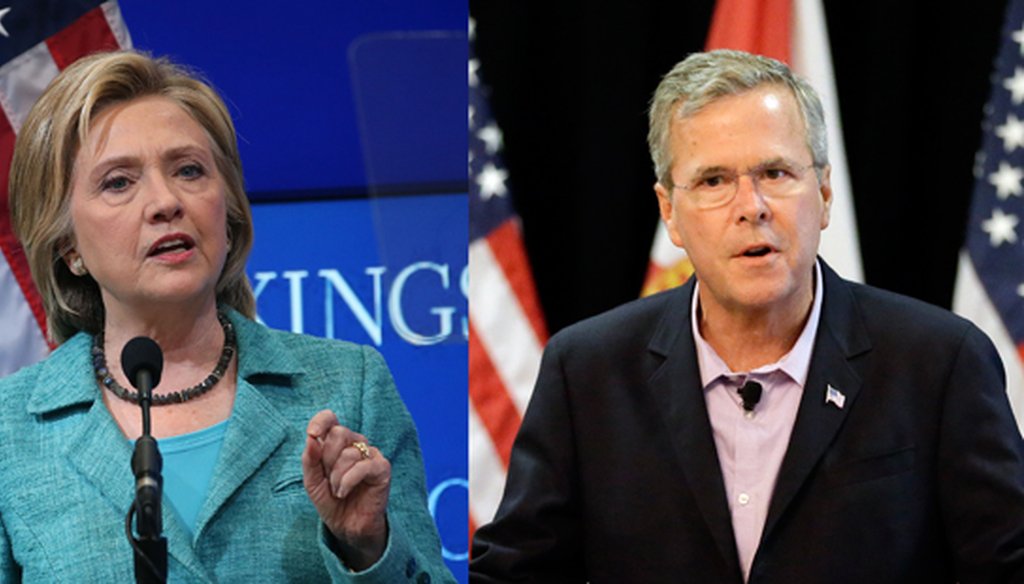Get PolitiFact in your inbox.

Hillary Clinton and Jeb Bush are already attacking each other like presumptive nominees, and Florida is one of the main battlegrounds. (Getty Images, AP)
As the summer of 2015 draws to a close, presidential hopefuls Hillary Clinton and Jeb Bush are attacking each other instead of focusing on their primary rivals.
Democratic candidate Clinton has gone after Bush’s record both as Florida’s governor and today, while the Republican has raised issues from Clinton’s days as a U.S. senator and secretary of state.
Here’s a look at some of the statements we’ve checked by both.
Hillary vs. Jeb
Clinton implied that Bush imposed restrictions on voting rights as governor between 1999 and 2007, saying during a June 4, 2015 speech: "In Florida, when Jeb Bush was governor, state authorities conducted a deeply flawed purge of voters before the presidential election in 2000. Thankfully, in 2004 a plan to purge even more voters was headed off."
She omitted that this effort started before Bush was in office, though it did continue under his watch. In 2004, the state scrapped another purge after officials admitted errors. We rated her statement Mostly True.
Clinton’s campaign has also compared Bush to GOP primary opponent Donald Trump, to make it seem as if Bush holds the same views as the billionaire. She said on July 7 that when it comes to undocumented immigrants, Bush "doesn't believe in a path to citizenship. If he did at one time, he no longer does."
At times, Bush has supported a path to citizenship, and at other times he hasn’t. He has said he might support a path to citizenship if it could make it through the political process. But in recent interviews, Bush has emphasized a path to legalized status instead of citizenship. We rate this claim Mostly True.
Later, Clinton said Trump and Bush’s views on immigration are so similar, there’s no difference between the two. "How do Jeb Bush and Donald Trump differ on immigration? Spoiler alert: They don't," her campaign wrote in an Aug. 25 tweet.
Bush and Trump agree in some areas, including getting rid of Obama’s executive action. Both also call for a pathway to legal status. But in many other areas they disagree. Trump calls for mass deportation, ending birthright citizenship and building a wall between Mexico and the United States, all major policy changes that Bush has denounced.
Clinton’s overall message that there is no daylight between Bush and Trump is misleading, although they overlap on a few immigration policies. We rated this claim Mostly False.
Jeb vs. Hillary
Bush has targeted Clinton since the day he announced his candidacy on June 15. He said in a speech that day that Clinton "insists that when the progressive agenda encounters religious beliefs to the contrary, those beliefs ‘have to be changed.’ "
But Bush is leaving out important context. Clinton talked about rates of maternal mortality, domestic violence, and lack of access to education and reproductive health care during a speech about women’s rights worldwide in April. She said that laws must protect those rights, "and deep-seated cultural codes, religious beliefs, and structural biases have to be changed." So the only area where she says beliefs must change that has a connection to domestic issues is in the reference to the overall category of reproductive health.
Bush was making Clinton’s remarks sound more sweeping than they actually are. Clinton was talking about specific issues affecting women’s health and safety, mainly in a global context. We rated his statement Half True.
Later, Bush said that Clinton had a poor record as a senator, saying that she "has her name on three laws in eight years."
Bush used vague language here, so we thought it was fair game to look at the three sponsored bills he mentioned, plus the 74 co-sponsored ones that passed. Congressional experts warned that legislative influence goes beyond having your name as a sponsor or co-sponsor. Senators weigh in with amendments, debate and negotiations.
Because the statement was partially accurate but left out important details, we rated Bush’s claim Half True.
Bush also has attacked Clinton’s use of a private server as secretary of state, saying that he had been a more open candidate. "I released all my emails," he said in an Aug. 27 campaign video.
But while he was trying to contrast himself to Clinton, he actually has given the same defense she did. Bush says he released all the emails he was required to under Florida law, in the same way Clinton says she turned over all the emails she was required to under federal law.
But Bush hasn’t turned over every single email he sent as governor. While the state handled his public account’s emails, he was allowed to self-edit [email protected] correspondence from his private server. What he turned over came to 280,000 emails out of a half-million or more, which Bush repackaged on a website earlier this year.
Bush’s statement contains an element of truth but ignores critical facts that would give a different impression. We rated it Mostly False.
Our Sources
See individual fact-checks for complete source lists.


























